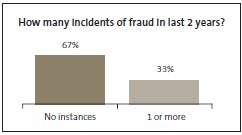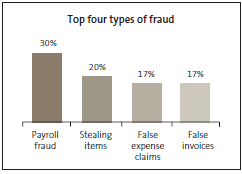Part 3: Incidents of fraud in district health boards
 Despite our generally "clean" image, fraud is a fact of business life in New Zealand: a third of the respondents were aware of at least one incident of fraud or corruption in their district health board within the last two years.
Despite our generally "clean" image, fraud is a fact of business life in New Zealand: a third of the respondents were aware of at least one incident of fraud or corruption in their district health board within the last two years.
Those who knew of an incident in the last two years were asked for details of the most recent incident.
The value of the most recent fraud noted by respondents in district health boards was mostly low, with 61% of frauds being for amounts of less than $10,000. Respondents put the monetary loss for 9% of fraud incidents between $10,000 and $100,000, and 13% at more than $100,000. About 17% of the respondents who answered this question did not know how much money was lost.
It is not always possible to accurately establish how much money has been lost in a fraud because sometimes the records and the investigation are incomplete. The percentage of frauds of more than $100,000 (13%) was higher for district health boards than it was for the wider central government sector (8%) and for the public sector overall (5%).
Most of the fraud incidents in district health boards (74%) were committed by one internal person acting alone, typically at an operational staff level.
 The most frequent types of fraud within district health boards were:
The most frequent types of fraud within district health boards were:
- payroll fraud, such as falsifying timesheets (30%);
- theft of property, plant, and equipment or inventory (20% combined).
- fraudulent expense claims (17%); and
- falsifying invoices (17%).
Most other types of entities experienced more theft of cash than timesheet falsification. District health boards were, by far, the most likely to experience payroll fraud. This could mean that it is an area of particular risk, or that district health boards have more effective systems for detecting payroll fraud than other entities.
The most common reason why fraud occurred was that the perpetrator did not think they would get caught (38%). Almost a quarter of respondents said that it occurred because internal control policies and procedures were not followed (24%).
Internal control systems were district health boards' most successful mechanism for detecting fraud, with 32% of frauds detected in this way. Internal tip-offs (other than through a formal whistle blowing system) led to 19% of the frauds detected, and internal audits detected a further 19%.
Respondents said that 3% of the fraud incidents were detected by the external auditor. This low percentage is not surprising, because detecting fraud is neither the purpose nor the focus of an external audit.
Questions 32 to 40 in Appendix 1 set out the survey response data about incidents of fraud.
page top